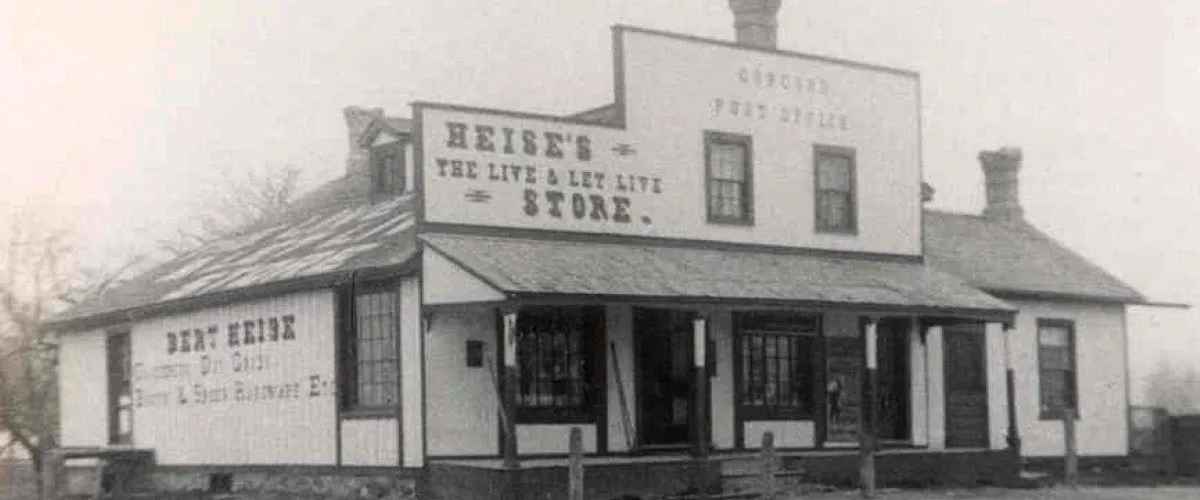From the archives: the Concord Post Office
Learn more about the
city’s history from the Vaughan Archives
From the traditional territories of the First
Peoples of Turtle Island, to a farmland community, to a bustling city centre
and everything in between – Vaughan's transformation is a story worth telling.
As part of a monthly series, the City of Vaughan releases historical content
from the Enterprise Information Management Services.
Scroll through memory lane, learn about the city's
past and explore the places, people and events that were pivotal to the
development of the Vaughan we know today. This month, the City is highlighting
the history of the Concord Post Office.
On Jan. 8, 1854, the
Concord Post Office was established at what is now the corner of
Dufferin Street and Highway 7. John Duncan served as the first postmaster until
1871. However, the job was not a full-time profession so he continued farming
as well.
Around 1874, the
original post office property was divided into two halves and the east half was
sold to Thomas Teasdale, who built a brick house, large barn and other
buildings on the property. The post office remained on the west half of the
property.
After John Duncan,
the role of postmaster was taken on by Henry McElroy who served from 1871 to 1888,
Ann McElroy who followed her husband
from 1888 to 1894, then W.J. Clarke from 1894 to 1899, William Golland from 1900
to 1903, John L. McDonald from 1903 to 1908, William Carson from 1908 to 1909,
Bert Hesie from 1909 to 1919 and Frank T. Miller in 1919.
Under the tenure of
the postmaster Norman Bowes, who served from 1919 to 1947, he constructed a new
building to replace the original post office which was burnt down to allow for
the widening of the road on May 14, 1917.
After Norman Bowes
retired, the post office was run by Evelyn Bowes from 1947 to 1950, Evelyn
Lapping from 1950 to 1963 and Verna Madill in 1963. Since Verna’s time as
postmistress, the post office experienced several location and staffing changes
before the postal service was officially taken over by Canada Post in 1981.
ABOUT VAUGHAN ARCHIVES
Established in 1988,
the City of Vaughan
Archives
is home to more than 600 collections, consisting of both City records and cultural
records about Vaughan from 1860 to the present day. Records include, but are
not limited to, the following:
- City business records with long-term legal and administrative value, such as Council meeting minutes, by-laws, assessment rolls, financial records, reports and official correspondence
- church, community and school records
- census records
- historical photographs
- land records
- historical maps, plans and aerial photographs
- newspapers
- personal papers of past residents and founding families, such as diaries, family histories, journals and letters
- records of local organizations both past and present
VIEW VAUGHAN'S ARCHIVES
ONLINE!
The City's Archival
Collection is on digital display for all to explore! The below galleries are
now available in the City's online gallery on Flickr:
- From Township to City: The Evolution of Vaughan
- Featured Artists of Vaughan
- Historical Families of Vaughan
- Historical Figures: Lord Beaverbrook
- Historical Photography
- Recollections of Rural Vaughan
- The Mary Wood Collection
- The Way We Were: Representations of Vaughan's Past
- Vaughan Working Environments
- Vaughan Through the Ages: Medicine
- Vaughan Through the Ages: Music
- Vaughan Through the Ages: Sports and Recreation
- Stories of Remembrance
- Vaughan's Forgotten Heroes
- Early Churches of Vaughan
- Historical Schools of Vaughan
A
personal Flickr account is not required to access the City's online gallery,
which contains only a small selection of the full archives collection. If you
are looking for a particular image, original file, primary source record or
more, please visit the Archival
Database, or contact the Vaughan
Archives by calling 905-832-2281 or emailing archives@vaughan.ca.
By managing and
preserving both City and community records, the Enterprise Information
Management Services team ensures that Vaughan's rich and varied history will
continue to be available for future generations. Learn more at vaughan.ca/archives.

